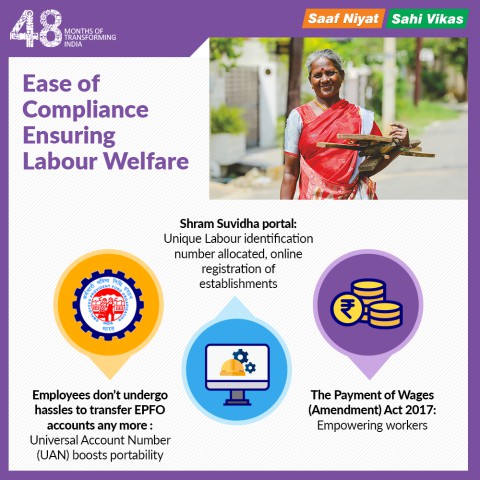[orc]The BJP government published an infographic on the 48-months portal that makes three claims about ensuring labour welfare. This article is a fact check of the claims.
The BJP government published an infographic on the 48-months portal that makes three claims about ensuring labour welfare. This article is a fact check of the claims.
What is the Shram Suvidha Portal?
According to the ‘Annual Report (2017-18)’ of the Ministry of Labour and Employment, ‘The Ministry of Labour & Employment has developed a unified Web Portal ‘Shram Suvidha Portal’, to bring transparency and accountability in enforcement of labour laws and ease complexity of compliance. It caters to four major Organizations under the Ministry of Labour, namely: Office of Chief Labour Commissioner (Central); Directorate General of Mines Safety; Employees’ Provident Fund Organization; and Employees’ State Insurance Corporation’.
Have unique identity numbers and online registration been established?
The first claim is that ‘Shram Suvidha Portal has been launched that allocates Unique labour identification number and enables online registration of establishments.’
As stated in the ‘Annual Report (2017-18)’ of the Ministry of Labour and Employment, ‘Allotment of Unique Labour Identification Number (LIN) to Units to facilitate online registration was started on the Portal with its launch in October 2014.. The unique Labour Identification Number has been issued to 2275391 units as of November 2017’.
Claim: Shram Suvidha Portal has been launched that allocates Unique labour identification number and enables online registration of establishments
Fact: Unique labour identification number has been launched along with the launch of the portal in 2014. Hence, the claim is TRUE.
What about hassle free transfer of EPFO accounts?
The second claim is that ‘Employees don’t undergo hassles to transfer EPFO accounts any more since Universal Account Number (UAN) boosts portability’.
As stated in the ‘Annual Report (2017-18)’ of the Ministry of Labour and Employment, ‘The portability of social security benefits has been extended to 6.57 million people through Universal account Number’. However, the annual report also gives data on the increasing number of EPF grievances year after year. As per the 2017-18 annual report, the total number of EPF grievances increased from 1.79 lakh in 2014-15 to 2.99 lakh in 2017-18 (only up to December 2017). Hence it is debatable whether the introduction of UAN has resulted in hassle free transfer of EPFO accounts.
Claim: Employees don’t undergo hassles to transfer EPFO accounts any more since Universal Account Number (UAN) boosts portability.
Fact: While it is true that the portability of social security benefits has been extended to 6.57 million people through Universal account Number, EPF related grievances are increasing year after year. As per the 2017-18 annual report, the total number of EPF grievances increased from 1.79 lakh in 2014-15 to 2.99 lakh in 2017-18 (only up to December 2017). Hence it is debatable whether the introduction of UAN has resulted in hassle free transfer of EPFO accounts. Hence the claim remains UNVERIFIED.
What about amendment to the Payment of Wages act?
The third claim is that ‘the payment of wages (amendment) act 2017 is empowering workers’.
The Payment of Wages (Amendment) Bill, 2016 was introduced in Lok Sabha in December. This bill amends the Payment of Wages Act, 1936. The Bill amends the 1936 act to permit the employer to pay an employee’s wages in the following ways.
- in coin or currency notes; or
- by cheque; or
- by crediting them into his bank account.
The Bill removes the requirement of obtaining written authorization for payment of wages by cheque or through a bank account. The bill also specifies that the central or state governments may specify certain industrial or other establishments where the employer should pay his employees only by cheque or by crediting the wages in his bank account.
Since the bill could not be passed, an ordinance was issued in December 2016. The bill became an act in February 2017 after it was passed by the parliament.
The act only removes the requirement of obtaining written authorization from the employee for payment of wages by cheque or through a bank account. However, there is no evidence or data to suggest that the act has empowered workers.
Claim: The payment of wages (amendment) act 2017 is empowering workers
Fact: The act only removes the requirement of obtaining written authorization from the employee for payment of wages by cheque or through a bank account. However, there is no evidence or data to suggest that the act has empowered workers. Hence, the claim is MISLEADING.
This story is part of a larger series on the 4-years of the Modi government. This series has been made possible with the flash grant of the International Fact Checking Network (IFCN). Read the rest of the stories in this series here



1 Comment
Your work is equivalent to The Indian Express’s EXPLAINED page. Keep going. Web portals like this is need of the hour.